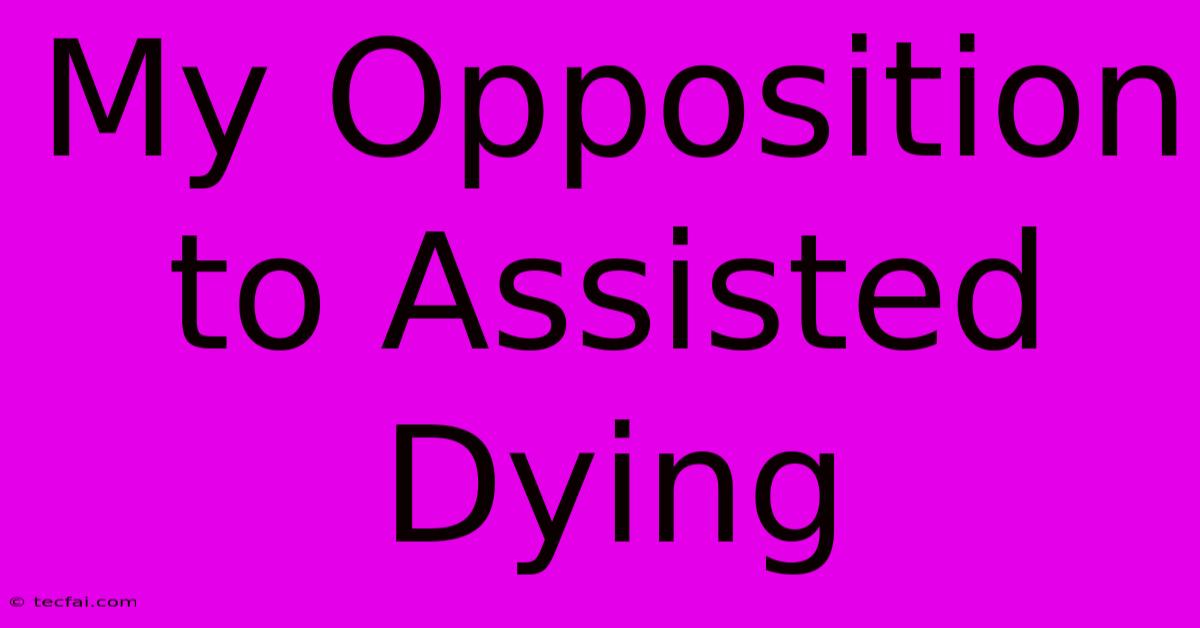My Opposition To Assisted Dying

Discover more detailed and exciting information on our website. Click the link below to start your adventure: Visit Best Website tecfai.com. Don't miss out!
Table of Contents
My Opposition to Assisted Dying: A Moral and Ethical Perspective
The debate surrounding assisted dying, also known as physician-assisted suicide or euthanasia, is complex and deeply emotional. While I understand and acknowledge the suffering of those facing terminal illnesses, I maintain a strong opposition to its legalization. My position stems from a multifaceted perspective encompassing moral, ethical, and practical considerations. This isn't a dismissal of suffering, but rather a careful examination of the potential consequences of altering fundamental societal values.
The Sanctity of Life: A Foundational Principle
At the heart of my opposition lies the belief in the inherent sanctity of human life. This principle transcends religious beliefs; it's a fundamental tenet that recognizes the intrinsic value of every human being, regardless of their physical or mental state. To intentionally end a life, even at the request of the individual, constitutes a violation of this fundamental principle. We have a moral obligation to protect and preserve life, not to actively participate in its termination. This isn't about denying suffering; it's about affirming the inherent worth of every human life.
Slippery Slope Concerns and Vulnerable Populations
Legalizing assisted dying opens a Pandora's Box of potential unintended consequences. The "slippery slope" argument, often criticized, holds significant weight. Initially, the focus may be on terminally ill adults with unbearable suffering. However, the criteria for eligibility could gradually expand, potentially encompassing individuals with disabilities, mental health conditions, or those facing less severe illnesses. The potential for coercion and abuse, particularly towards vulnerable populations, is a serious concern. Elderly individuals facing financial strain or feeling like a burden on their families might be subtly pressured into choosing assisted dying, even if they wouldn't otherwise.
The Role of Palliative Care and Improved End-of-Life Options
Instead of focusing on ending life, we should prioritize enhancing the quality of life for those facing terminal illness. Expanding access to high-quality palliative care is crucial. Palliative care focuses on managing pain and symptoms, providing emotional and spiritual support, and ensuring a comfortable and dignified death. Investing in and improving access to such care provides a compassionate alternative that addresses suffering without resorting to ending life. Furthermore, exploring and developing other end-of-life options, such as advanced directives and improved hospice care, should be our priority.
The Inherent Limitations of Informed Consent
While proponents emphasize informed consent, the complexities of terminal illness challenge the idea of truly informed decision-making. The emotional distress, physical pain, and influence of depression can cloud judgment. Are individuals truly making autonomous choices when facing such overwhelming circumstances? The potential for subtle coercion, even unintentional, raises significant doubts about the validity of consent in these situations. We need to ensure that any decision regarding life's end is truly free from external pressures.
Conclusion: A Call for Compassionate Alternatives
My opposition to assisted dying is not rooted in a lack of compassion. On the contrary, it arises from a deep concern for the protection of human life and the prevention of potentially devastating unintended consequences. We must focus on providing comprehensive palliative care, ensuring access to quality end-of-life options, and fostering a society that values and respects the lives of all individuals, regardless of their health status. A compassionate society finds better ways to support its vulnerable members, not to hasten their deaths. The discussion surrounding assisted dying requires careful consideration, and we must prioritize protecting the most vulnerable among us while simultaneously providing compassionate care for those facing the end of life.

Thank you for visiting our website wich cover about My Opposition To Assisted Dying. We hope the information provided has been useful to you. Feel free to contact us if you have any questions or need further assistance. See you next time and dont miss to bookmark.
Featured Posts
-
Best Sephora Black Friday Deals 2024
Nov 30, 2024
-
Uk Stadium Tour Fender Ticket Prices
Nov 30, 2024
-
Gamings Best Black Friday Sales
Nov 30, 2024
-
Sanders Breaks Colorado Football Record
Nov 30, 2024
-
Fifa Best Goal Onuachu Nominated
Nov 30, 2024
